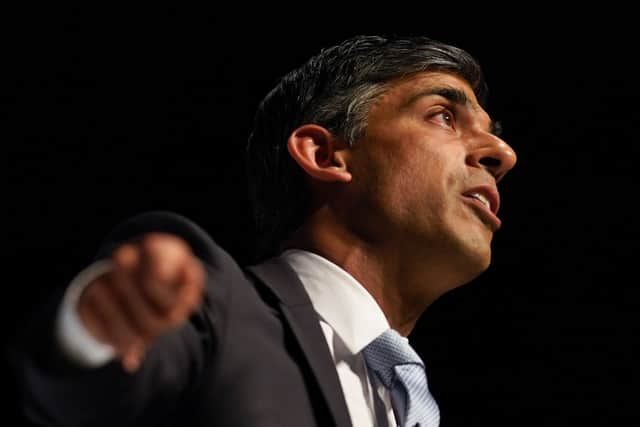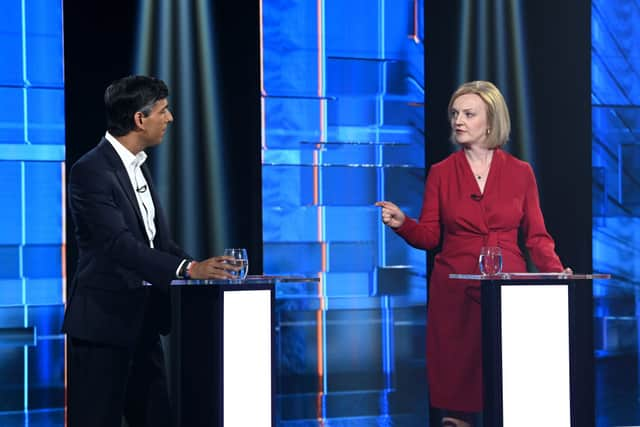Tory leadership race: how do Rishi Sunak and Liz Truss compare on cost of living plans?
and live on Freeview channel 276
Rishi Sunak and Liz Truss are battling it out in the race to replace Boris Johnson as Prime Minister, but both have very different ideas about how to tackle the cost of living crisis.
Depending on which Tory leadership candidate ends up in Number 10, households could either see more tax cuts or increased financial aid from the Government as the country heads towards a winter in which energy bills could rise to over £4,000.


Advertisement
Hide AdAdvertisement
Hide AdCurrent Prime Minister Boris Johnson (with his former chancellor Mr Sunak) has already brought in emergency help, such as a £650 cost of living payment for eligible households, a £400 energy bills discount to all taxpayers, and a £150 council tax rebate.
But since then the cost of living crisis has continued to spiral, and calls are mounting for an emergency budget and more aid.
What happens next ultimately depends on who Tory party members vote in as the new Prime Minister, so NationalWorld has taken a look at what the two hopefuls for the role have said about what they would do to ease the cost of living crisis thus far.
Rishi Sunak


The former Chancellor has claimed he will increase cost of living payments by “a few hundred pounds” if he becomes the next Prime Minister.
Advertisement
Hide AdAdvertisement
Hide AdIn a statement, Mr Sunak said: “This winter is going to be extremely tough for families up and down the country, and there is no doubt in my mind that more support will be needed.
“Bills are going up by more than anyone expected and the next government will need to act.”
The Richmond MP said he will act as soon as there is more clarity about how much bills will go up by.
He also criticised Ms Truss’ tax proposals, claiming they “are not going to help” people on low incomes or pensioners, who he described as the people who will be needing the most support.
Advertisement
Hide AdAdvertisement
Hide AdThis comes as experts at Cornwall Insight predicted energy bills could rise to an alarming £3,582 a year from October and £4,266 a year from January, with charities warning that vulnerable households will turn to “desperate methods” to save money.
Mr Sunak has also said he will go further than the support of up to £1,200 he announced as chancellor.
“I will look at doing more and particularly for families like pensioners, for example.”
His plans have come as a surprise to some, as in the early stages of the leadership contest the former chancellor positioned himself as one of the most fiscally conservative candidates.
Advertisement
Hide AdAdvertisement
Hide AdHe condemned the Foreign Secretary’s promises of unfunded tax cuts as “comforting fairy tales” and previously told voters he would keep the national insurance hike in place if he becomes Prime Minister.
However, Mr Sunak then pledged to scrap VAT on all domestic energy bills for the next year if he ends up in Number 10, in a move which would save the average household £160.
This prompted critics to accuse him of “flip-flopping on tax,” with Business Secretary Kwasi Kwarteng, a senior ally of Ms Truss, suggesting the pledge only came as a response to his rival’s vows to cut tax.
Liz Truss


Ms Truss on the other hand has refused to promise new cost of living payments and has said she will not give “handouts” to families.
She instead will focus on cutting taxes.
Advertisement
Hide AdAdvertisement
Hide AdThe Foreign Secretary told the Financial Times: "Of course, I will look at what more can be done.
"But the way I would do things is in a Conservative way of lowering the tax burden, not giving out handouts."
She came under fire by some for these comments, which prompted former Tory leadership hopeful Penny Mordaunt to defend Ms Truss - arguing that her comments had been misinterpreted.
But Mark Harper, former chief whip, wrote on Twitter: “Stop blaming journalists (again) - reporting what you actually say isn’t ‘misinterpreted’.
Advertisement
Hide AdAdvertisement
Hide Ad“This kind of thing happened under the current [Prime Minister] and hugely damaged trust in us all.
“So just what does ‘not giving handouts’ mean then?”


Mr Sunak added to the criticism of his rival, saying it is “simply wrong to rule out further direct support.”
Ms Truss’ current plans include slashing National Insurance by £59 a year for minimum wage workers.
She has also said she will cut green levies on energy bills.
Advertisement
Hide AdAdvertisement
Hide AdBut she too may be making a U-turn on cost of living plans, as key ally James Cleverly revealed: “For the people who won’t benefit directly from tax cuts, she is looking at targeted help.”
She also told the Evening Standard: “I can assure you that I will do all I can to help households across Britain. I understand how difficult the circumstances are.”
Experts have expressed concern that tax cuts could increase inflation, which is currently at a 40-year high of 9.4%.
Comment Guidelines
National World encourages reader discussion on our stories. User feedback, insights and back-and-forth exchanges add a rich layer of context to reporting. Please review our Community Guidelines before commenting.
